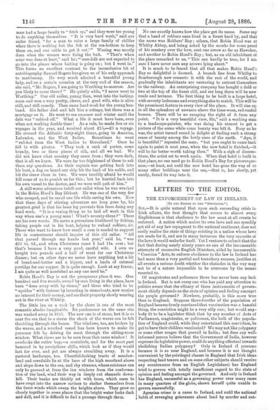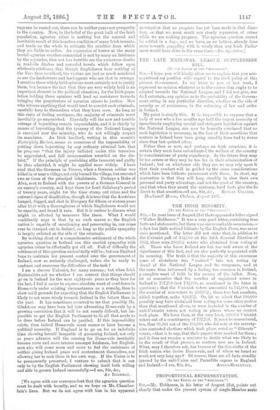LETTERS TO THE EDITOR.
THE ENFORCEMENT OF LAW IN IRELAND.
[TO THE EDITOR OF THE "SPECTATOR." _I
SIR,—It is quite natural that upon each succeeding crisis in Irish affairs, the first thought that occurs to almost every- Englishman is that obedience to the law must at all events be enforced. A nation which makes its own laws and can speedily get rid of any law repugnant to the national sentiment, does not easily realise the state of things existing in a nation whose laws- are made for it, and are in many instances the very opposite of the laws it would make for itself. Yet I venture to submit that the- fact that during nearly ninety years no one of the innumerable- attempts of successive English Ministers, aided by innumerable- " Coercion "Acts, to enforce obedience to the law in Ireland has- had more than a very partial and transitory success, justifies at all events a serious doubt whether the obstacles in the way may not be of a nature impossible to be overcome by the means- resorted to.
Of magistrates and policemen there has never been any lack in Ireland. But is not every one who has paid any attention to politics aware that the efficacy of these instruments of govern- ment chiefly depends on the state of opinion and feeling amongst the people governed ? Nowhere, probably, is this more true than in England. Suppose three-fourths of the population of England became firmly convinced that vaccination was a baneful thing, the conviction might be a very silly one ; but would any- body fit to be a legislator think that by any number of Acts of Parliament, magistrates, or policemen, the bulk of the popula- tion of England could, while they entertained this conviction, be got to have their children vaccinated? We may not like polygamy or some other usages that prevail in India ; but does any well- informed person believe that the Government of India, however supreme its legislative power, could do anything effectual towards abolishing Indian polygamy? Only in Ireland (I presume- because it is so near England, and because it is not thought convenient by the privileged classes in England that Irish ideas respecting land tenure and on some other subjects should receive any countenance from an English Legislature) has England tried to govern with totally insufficient regard to the state of opinion and feeling amongst the governed. And only in Ireland has England, successful as a governing power over many races in many quarters of the globe, shown herself quite unable to govern successfully.
Agrarian crime is a curse to Ireland, and until the national habit of revenging grievances about land by murder and out-
rage can be rooted out, there can be neither peace nor prosperity in the country. Now, in the belief of the great bulk of the Irish population, agrarian crime is nothing but the natural and inevitable result of this hopeless condition of many Irish tenants, and tends on the whole to mitigate the cruelties from which they are liable to suffer. An expression of horror at the many brutal agrarian murders committed is met by many an Irishman by the rejoinder, that not less horrible are the numerous deaths in roadside ditches and unroofed hovels which follow upon wholesale evictions; that though Englishmen hear nothing of the lives thus sacrificed, the victims are just as much murdered as are the landowners and land-agents who are shot in revenge. I mention these widely held opinions most certainly not to justify them, but because the fact that they are very widely held is an important element in the political situation ; for the Irish popu- lation holding these opinions will lend no assistance towards bringing the perpetrators of agrarian crimes to justice. Men who witness anything that would tend to convict such criminals, carefully keep to themselves what they have seen. As long as this state of feeling continues, the majority of criminals must inevitably go unpunished. Especially will the new and terrible outrage of boycotting remain unpunishable, and it is chiefly by means of boycotting that the tyranny of the National League is exercised over the minority, who do not willingly respect its mandates. An Irish landlord, writing in this month's Fortnightly Review, seems so conscious of the impossibility of putting down boycotting by any ordinary criminal law, that he proposes "that the injury inflicted under this terrorism be appreciated, and full compensation awarded on the dis- trict." If the principle of punishing alike innocent and guilty be thus admitted, it might be applied more widely. I have read that the Germans in France, when a German soldier was killed in or near a village, not only burned the village, but executed two or three of the principal inhabitants. Perhaps a Duke of Alva, sent to Ireland with the powers of a German General in an enemy's country, and kept there for Lord Salisbury's period of twenty years, might for the time stamp out crime and the outward signs of disaffection, though it is true that the Austrians hanged, flogged, and shot in Hungary for fifteen or sixteen years after 1849 with a thoroughness of which Englishmen would not be capable, and found it vain. But it is useless to discuss what might be effected by measures like these. What I would confidently urge is that by no such means as the English nation is capable of sanctioning and persevering in, can crime ever be stamped out in Ireland, so long as the public sympathy is largely enlisted on the side of the criminals.
By nothing short of a comprehensive settlement of the whole agrarian question in Ireland can this morbid sympathy with agrarian crime be effectually got rid off. Full of difficulty the settlement of this question undoubtedly will be ; but can England hope to maintain her present control over the government of Ireland, now so seriously challenged, unless she be ready to confront and overcome the difficulties of the task ?
I am a sincere Unionist, for many reasons ; but when Irish Nationalists ask me whether I am content that things should go on in Ireland for the next eighty-six years as they have for the last, I feel it easier to express absolute want of confidence in Home-rule under existing circumstances as a remedy, than to show solid grounds for expecting that the English Parliament is likely to act more wisely towards Ireland in the future than in the past. It has sometimes occurred to me that possibly Mr. Gladstone may have been led into advocating Home-rule by a growing conviction that it will be not merely difficult, but im- possible to get the English Parliament to do all that needs to be done before Ireland can be pacified. If this impossibility exists, then indeed Home-rule must sooner or later become a political necessity. If England is to go on for an indefinite time showing herself incapable of governing Ireland, not only as years advance will the craving for Home-rule inevitably become more and more intense amongst Irishmen, but English- men also will come more and more to feel the unfairness of neither giving Ireland peace and contentment themselves, nor allowing her to seek them in her own way. If the Union is to be permanently preserved, I venture to submit that it can only be by the English Parliament showing itself both willing and able to govern Ireland successfully.—I am, Sir, &c., AN IRISHMAN.
[We agree with our correspondent that the agrarian question must be dealt with broadly, and as we hope on Mr. Chamber- lain's lines. Bat we do not agree with him in his apparent
assumption that no progress has yet been made in that direc- tion, or that we must remit our steady repression of crime while we are making progress. The agrarian question cannot be settled in a day ; and we have, as we believe, already done more towards grappling with it wisely than any Irish Parlia• ment would have done in the same time.—En. Spectator.;



































 Previous page
Previous page